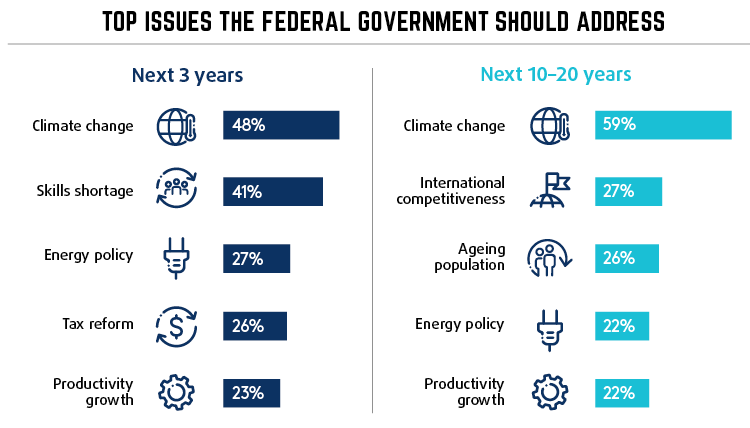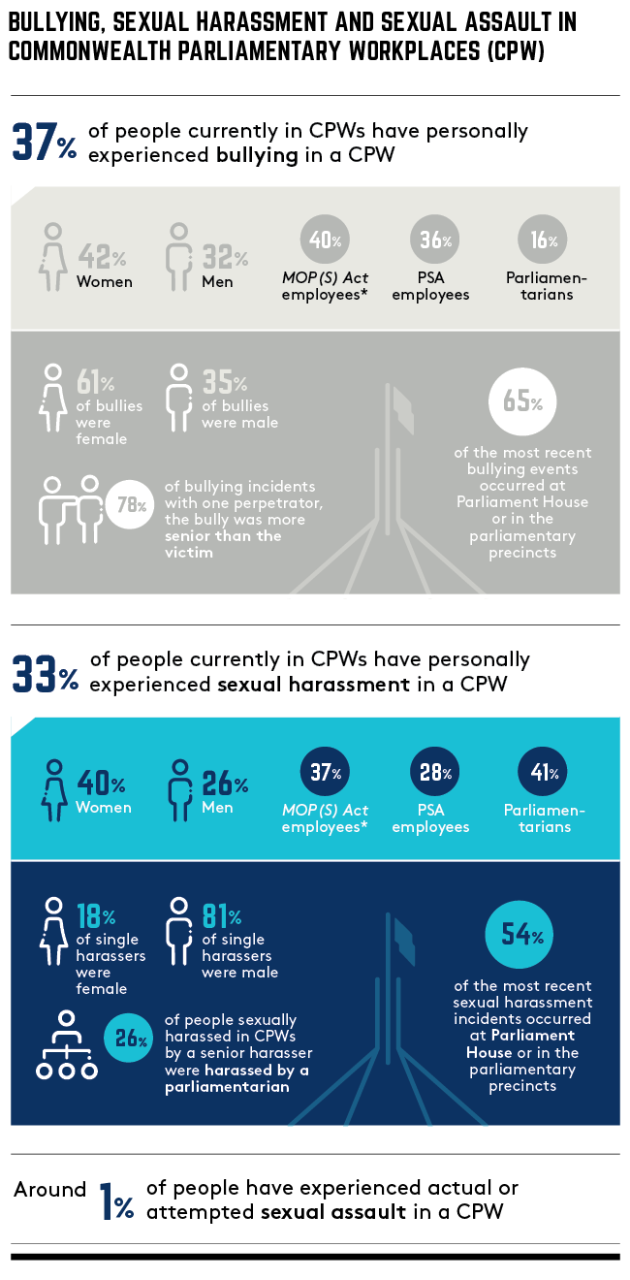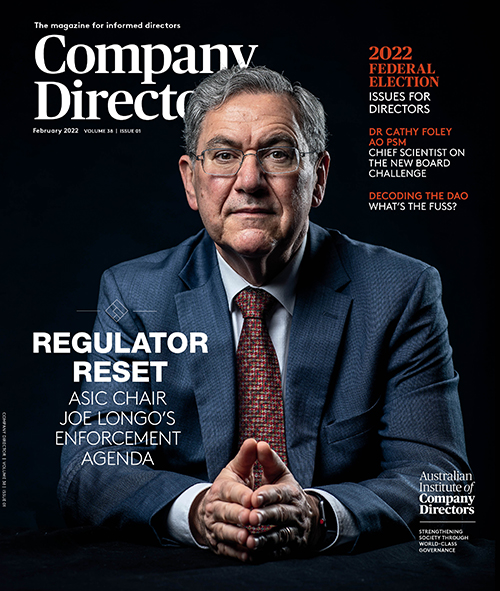The latest AICD Directors’ Sentiment Index paints a more optimistic picture for 2022, with climate, cybersecurity and infrastructure investment front of mind.
High vaccination rates and better than expected national finances underpin a strong outlook for 2022, according to results from the latest Directors’ Sentiment Index (DSI) conducted by Roy Morgan. The twice-yearly directors’ pulse, which surveyed more than 1600 members in October–November 2021, is in positive territory, showing more director optimism than pessimism and a score of +17.9. This is the highest since 2011, exceeding the previous peak of +12.7 in 2018. Some 67 per cent of directors said they were confident of Australia’s 12-month economic outlook and directors expect investment, turnover and profits to grow. The research flags a “hangover” of pandemic problems to endure into 2022 — with staff shortages, wage inflation and rising costs likely to be challenges in the coming year due to reduced skilled migration and global supply chain issues. More than half (55 per cent) say they face labour shortages, 69 per cent predict labour demands will increase and 84 per cent expect costs to rise.
Cybersecurity remains the number-one issue keeping 41 per cent of directors awake at night, although 86 per cent are confident they understand the risks and opportunities presented by technology. Just over half believe their board has enough oversight over cyber threats.
Directors are looking for decisive action on a number of issues in addition to major policy priorities:
Climate change: Responding to climate change should be Canberra’s most important priority over the next three years, according to 48 per cent of all directors. Support rises to 59 per cent when considered over the next 10–20 years. Some 60 per cent support an emissions trading scheme for the Australian economy.
Infrastructure: Top priority for public infrastructure investment should be renewable energy sources, say 70 per cent of directors. Some 28 per cent believe infrastructure investment focus should be in nuclear energy, showing a broad desire for development of a diverse and low-carbon energy matrix in Australia.
Vaccinations: 76 per cent believe COVID-19 vaccines should be obligatory for all staff in their sector.
Skills:
73 per cent agree their company needs to diversify employee skill sets with a specific focus on digital capabilities (59 per cent).

Be a team player
We shouldn’t be dazzled by digital, said CSIRO chief executive Dr Larry Marshall, launching new research compiled with the Business Council of Australia, Unlocking the Innovation Potential of Australian Companies. “It’s an important part of science, but it’s not the only part.”
Marshall noted that innovation happens at the intersections of people and domains, making collaboration key. “Aussie ingenuity is alive, but innovation is a team sport. If we are to realise a bold, technology-led recovery, we will need business and research playing together to win, he said. “To truly reimagine and reinvent our industries, to access new markets, and to build in resilience at the foundations, we must embrace the full power of every part of science and technology.”
However, the research also cautions on the need to overcome the obstacles and embrace the enablers in order to translate research into scalable, commercial outcomes.
Strategy or risk?
Research for the Director Sentiment Index, conducted by Roy Morgan, included deep dives on issues such as board focus and reporting workload. The majority of directors said the main focus of their board was on strategy and growth rather than risk and compliance.
Majority of boards focus on strategy and growth over risk
Do you believe the main focus of your board is on...?
27% Risk and compliance or 73% Strategy and growth
How confident are you in carrying out oversight of risk for the organisation?
95% confident vs 2% Not confident
Current director liability provisions negatively impact my ability to make decisions
34% vs Agree 28% Disagree
The current level of corporate reporting requirements is satisfactory
54% vs Agree 22% Disagree
Current governance regulations strike the appropriate balance between oversight and maintaining a competitive environment
44% Agree Vs 29% Disagree
Health of wealth
A data scan by property analytics platform CoreLogic reveals Australia’s predominant reliance on real estate for wealth-building.
$9.3tr residential property
$3.3tr superannuation
$2.8tr listed stocks
$1tr commercial property
10.7m residential dwellings
$2tr outstanding mortgage debt
55.4% of household wealth is held in housing
Sources: CoreLogic, Australian Bureau of Statistics, RBA, APRA, ASX.
Parliamentary privilege
A landmark report into sexual harassment and bullying in parliament, Set the Standard: Report on the Independent Review into Commonwealth Parliamentary Workplaces, released in November, calls out a “leadership deficit” as a risk factor for poor behaviour. The Australian Human Rights Commission research is based on responses from 968 staff about their experiences in commonwealth parliamentary workplaces (CPWs). Participants described what a “leadership deficit” looks like in a CPW:
- Leadership responses (individual and institutional) which minimise, trivialise or excuse misconduct
- Inconsistent role modelling of respectful and inclusive behaviour
- Prioritisation of political gain over people management
- Leaders who are not equipped with relevant skills or focused on people management.
The inquiry, led by Sex Discrimination Commissioner Kate Jenkins GAICD, identified a range of risk factors for misconduct including the absence of clear or consistent standards of conduct and behaviour, as well as limited people management skills or experience among parliamentarians and people in senior positions.
“The lack of standards and leadership ‘deficit’ combine to mean that leaders often do not know how to prevent or respond to misconduct, or to role model appropriate behaviour,” the report finds, with participants saying that much of the misconduct they observed or experienced came from those in senior positions.
Other findings include:
26% of people sexually harassed by a single harasser were harassed by a parliamentarian
54% of the most recent sexual harassment incidents occurred at Parliament House or precincts.
For further information, access the 28 recommendations of the Set the Standard report.

Supply chain blockages and a shortfall of shipping and freight space, rising costs and labour shortages — it’s a combination that will make for headwinds for growth and feed inflationary pressures in the year ahead.
In its latest industry outlook, global logistics services company CH Robinson says that the sector will continue to feel the ongoing impacts of the pandemic, including a shortage of air freight and a surge in demand for goods. While air freight is likely to ease with the reopening of borders, an undersupply of ocean carriers is also contributing to the issues, with inventory levels the lowest since the 1990s. The shortage of ocean freight is unlikely to ease until late 2022 into 2023, while global trade and tariff issues are also sharpening.
Director IDs
On 2 February, the AICD will host a webinar (complimentary for members) to bring directors up to date and guide them through the process to register for director identification numbers. By November 2022, directors of Australian entities will be required to have a director ID — to be kept permanently and provide traceability of the director’s profile and association with entities over his or her career.
Latest news
Already a member?
Login to view this content


